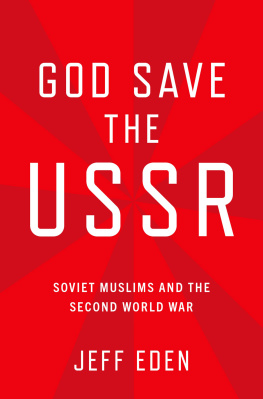First published 1992 by Westview Press
Published 2019 by Routledge
52 Vanderbilt Avenue, New York, NY 10017
2 Park Square, Milton Park, Abingdon, Oxon OX14 4RN
Routledge is an imprint of the Taylor & Francis Group, an informa business
Copyright 1992 by Radio Free Europe/Radio Liberty
All rights reserved. No part of this book may be reprinted or reproduced or utilised in any form or by any electronic, mechanical, or other means, now known or hereafter invented, including photocopying and recording, or in any information storage or retrieval system, without permission in writing from the publishers.
Notice:
Product or corporate names may be trademarks or registered trademarks, and are used only for identification and explanation without intent to infringe
Library of Congress Cataloging-in-Publication Data
Tolz, Vera.
The USSR in 1990 : a record of events / compiled by Vera Tolz : edited by Melanie Newton.
p. cm.
Includes bibliographical references and index.
1. Soviet UnionPolitics and government
1985 Chronology. 2. Soviet UnionHistory
1953 Chronology. I. Newton, Melanie.
DK286.U87 1992
947.085 4dc20
91-40048
CIP
ISBN 13: 978-0-367-29703-9 (hbk)
Why, one might ask, a chronology of the year 1990 in the USSR when we already know about the putsch of August, 1991, and the collapse of the Communist empire? It is precisely because one extraordinary event follows the other with such baffling rapidity that all who are actively concerned with contemporary developments in that part of the world need a carefully compiled daily record at their fingertips. To understand the dynamics of change, one first needs the facts; to explain why, one must first ask what, when, and where? The answers are readily available here.
Historians and political scientists are often accused of selecting only the evidence that supports their thesis, while conveniently forgetting those awkward facts that cannot be made to fit. In her masterly chronology of the significant developments of 1990, Vera Tolz has avoided any such pitfalls. Her task was to achieve an objective compilation of events judged solely on the criteria of their long-term importance for the USSR and the world. In this she has succeeded admirably, adding her own expert analysis and drawing on that of her colleagues when necessary. The selection is balanced, comprehensive, and eminently sensible. Melanie Newton has completed the editing with her usual thoroughness and skill. The name index and subject index, together with the chronological presentation of the text, allow one to find a specific item of information rapidly. But a leisurely browse through the contents will also reap a rich reward, for 1990 was indeed an amazing year.
In 1990 Mikhail Gorbachev entered his sixth year in power, and it was already clear that the reform process initiated by him in March, 1985, had run far beyond his control. The fragmentation of the USSR was proceeding apace, with the Baltic republics, Armenia, and Georgia leading the other republics in breaking away from the central government, and with the RSFSR itself, under Boris Eltsin, intent on pursuing an independent course. Republican parliaments adopted laws that clashed with Gorbachevs all-Union legislation, and some republics actively encouraged draft evasion, preventing the Soviet Army from raising its intended quota of young recruits for compulsory military service beyond their borders.
Added to this, the generals were offended by the undignified withdrawal of Soviet troops from Eastern Europe and the lack of decent quarters to house them on their return. Ethnic hostilities within the ranks of the armed forces were exacerbated by the growing use of military units to police republics seeking independence. The officer corps, although less subject to ethnic tensions because of being drawn mainly from Russians or members of the other Slav nations, was itself evidently divided on how far to support liberal reforms and the loss of Party control. Defense Minister Dmitrii Yazov did not attempt to conceal his repressive views. The KGB, under another budding putschist, Vladimir Kryuchkov, produced a draft law on the role of the security organs that was hotly debated by reformist deputies, and republican leaderships began to separate their domestic security organizations from the all-Union KGB. The appointment of Boriss Pugo to head the MVD internal troops reinforced the reactionary elements around Gorbachev.
The Nagorno-Karabakh dispute between Armenia and Azerbaijan escalated. Baku suffered hundreds of casualties when Soviet troops violently occupied the city in January. More than twenty people were killed and several hundred injured in the riots that shook the Tajik capital of Dushanbe in February, and interethnic clashes caused bloodshed in Kirgizia, Moldavia, and other republics. Gorbachevs reluctant drafting of a new Union treaty came too late, and the draft was too limited in its scope to satisfy the aspirations of most republican leaders.
The Twenty-eighth Congress of the CPSU in July adopted statutes allowing more initiative to Communist leaders at the republican level and making the Party first secretary of each republic ex officio a member of the Politburo, which, however, was by then much degraded in its powers and no longer the center of policy formation. The membership of the CPSU continued to fall as it steadily lost control over the instruments of government, while several opposition movements emerged. The CPSU lost its monopoly on power with the abolition of Article 6 of the USSR Constitution, and the Supreme Soviet eventually adopted legislation to promote the development of a multiparty system.
The trends already evident in 1990 may have pointed the way for the hard-line Communists who plotted the August putsch of 1991. Gorbachev had failed to hold the USSR together and had failed to reassert the authority of the CPSU. Moreover, he had presided over a disastrous decline in the economy. The Shatalin plan, although not radical enough for some pro-market reformers, delegated more responsibility to the republics than Gorbachev and his immediate advisers were prepared to accept. Gorbachevs attempts to run the economy by decree proved ineffective, and industrial output continued to fall.
Only in his foreign policy initiatives did Gorbachev appear to make some progress in 1990; yet here too internal pressures played a major role. German reunification brought immediate deutsche mark dividends, while the USSRs withdrawal of troops from Eastern Europe and its new willingness to reach agreements on reducing arms made the United States and Western Europe more inclined to help Gorbachev overcome his domestic problems. There was also a clear economic incentive behind the dramatic improvement in relations with South Korea and Saudi Arabia. Nonetheless, the surprise resignation of Eduard Shevardnadze in December emphasized that the reactionary forces still ensconced in positions of power were actively opposing reforms in foreign policy also.
Regular readers of the RFE/RL Research Institutes weekly publication Report on the USSR and of the RFE/RL Daily Report, from which this book draws much of its material, will have followed in detail how the trends covered here have culminated in the even more momentous events of 1991. This is indeed history in the making, and in presenting it in the form of a carefully documented day-by-day record, the compilers have performed an invaluable service.


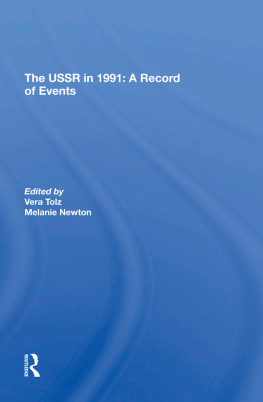
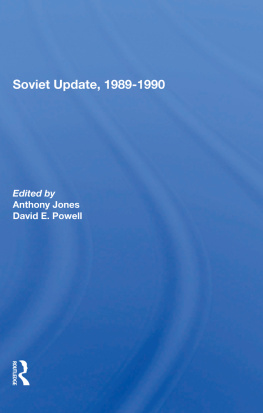

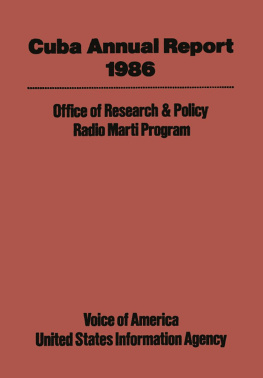
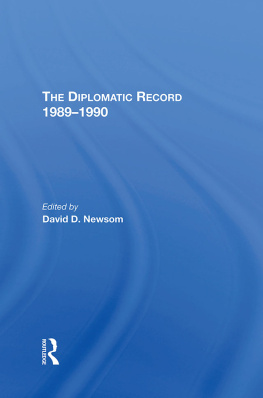
![Laura L. Finley - Crime and Punishment in America: An Encyclopedia of Trends and Controversies in the Justice System [2 Volumes]](/uploads/posts/book/305562/thumbs/laura-l-finley-crime-and-punishment-in-america.jpg)
![James Francis LePree Ph.D. (editor) - The Byzantine Empire [2 volumes]: A Historical Encyclopedia](/uploads/posts/book/296844/thumbs/james-francis-lepree-ph-d-editor-the-byzantine.jpg)
